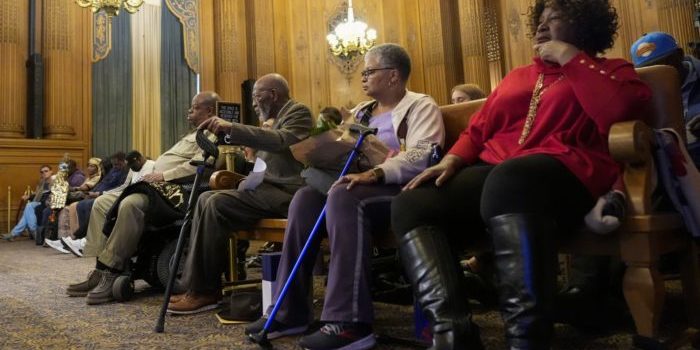(Headline USA) Supervisors in San Francisco formally apologized Tuesday to African Americans and their descendants for the city’s role in perpetuating racism and discrimination, with several claiming that it was just the start of reparations for black residents and not the end.
However, despite the virtue-signaling, the city, which has been hit hard by its recent policy failures, was forced to cut funding in December for its once-touted Office of Reparations due to a budget shortfall.
Moreover, after the ludicrous proposals of a task force last year designed to consider the appropriate measures for the far-left city—in a state where slavery was never legally practiced—polls revealed that a majority of Californians opposed the idea of reparations altogether.
Indeed, Tuesday’s resolution appeared to be more of a face-saving measure to show that the earlier overtures were not entirely disingenuous, despite the lack of financial restitution for circumstances that the city’s current black residents likely never experienced firsthand.
The resolution listed several perceived grievances the city had committed against blacks, such as property redlining, the razing of the historically black Fillmore neighborhood in the name of urban renewal, and intentional policies and practices by the city that robbed black residents of opportunities to build generational wealth.
Black people, for example, make up 38% of San Francisco’s homeless population despite being less than 6% of the general population, according to a 2022 federal count. There are about 46,000 black residents in San Francisco.
The vote was unanimous, with all 11 board members signed on as sponsors.
“This historic resolution apologizes on behalf of San Francisco to the African–American community and their descendants for decades of systemic and structural discrimination, targeted acts of violence, atrocities,” said Supervisor Shamann Walton, “as well as committing to the rectification and redress of past policies and misdeeds.”
Supervisor Dean Preston, who represents the Fillmore neighborhood, said that some of the leaders backing the apology still wanted to build “unaffordable housing for mostly wealthy, white people” on public land.
San Francisco joined another far-left U.S. city, Boston, in issuing an apology. Nine states have formally apologized for slavery, according to the resolution.
“We have much more work to do but this apology most certainly is an important step,” said Walton, the only black member of the board and chief proponent of the resolution.
It was the first reparations recommendation of more than 100 proposals made by a city committee to win approval. The African American Reparations Advisory Committee also proposed that every eligible black adult receive a $5 million lump-sum cash payment and a guaranteed income of nearly $100,000 a year to remedy San Francisco’s deep racial wealth gap.
But there has been no action on those and other proposals, and some supervisors Tuesday took a dig at public-safety measures on next Tuesday’s city ballot that they bizarrely claimed would harm black residents, insinuating that the black community at large—not individual bad actors—was responsible for the wave of violent crime that has caused residents, businesses and tourists to flee en masse.
Preston referenced two measures backed by Mayor London Breed, who is black, including one to screen welfare recipients for drug addiction and another to give more powers to the police department.
“People want an apology,” he said. “But they also want a commitment not to repeat harms.”
The mayor has said she believes reparations should be handled at the national level, and facing a budget crunch, her administration eliminated $4 million for the proposed reparations office in cuts this year.
In 2020, California became the first state in the nation to create a task force on reparations. The state committee, which dissolved in 2023, also offered numerous policy recommendations, including methodologies to calculate cash payments to descendants of enslaved people.
But reparations bills introduced by the California Legislative Black Caucus this year also left out financial redress—with one key exception being proposals to compensate people whose land the government seized through eminent domain.
Reparations advocates urged San Francisco to move faster in adopting changes made by the city reparations committee, including policies to improve education, employment and housing options for black people.
Cheryl Thornton, a city employee who is black, said that an apology alone did little to address current problems, such as shorter lifespans for black people.
“That’s why reparations is important in health care,” she said. “And it’s just because of the lack of healthy food, the lack of access to medical care and the lack of access to quality education.”
Adapted from reporting by the Associated Press

